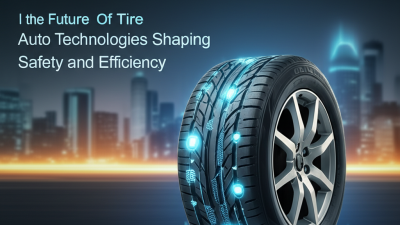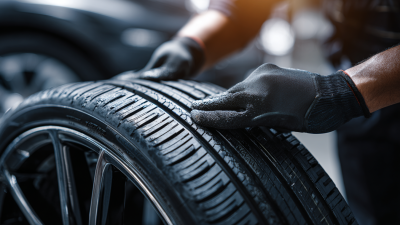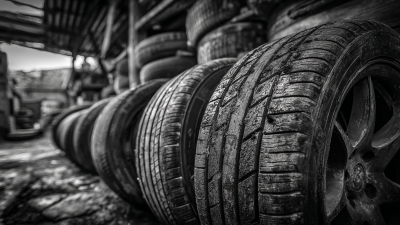Why Choosing the Right Auto Tire Can Enhance Your Vehicle Performance
Choosing the right auto tire is crucial for enhancing your vehicle’s performance, safety, and overall driving experience. As the only point of contact between your vehicle and the road, tires significantly influence everything from traction and braking to fuel efficiency and ride comfort. In this article, we will explore essential tips to help you make an informed decision when selecting auto tires that align with your driving needs and conditions.
Understanding the various types of auto tires and their features is key to optimizing your vehicle's capabilities. Whether you're navigating city streets, tackling off-road adventures, or cruising on the highway, the right tires can improve handling, responsiveness, and durability. By focusing on factors like tread design, rubber composition, and tire size, you can elevate your car's performance while ensuring a safer journey for you and your passengers. Join us as we delve into the best practices for selecting auto tires that not only meet your vehicle's specifications but also enhance your overall driving pleasure.

Top 5 Benefits of Selecting the Right Tires for Your Vehicle Performance
Choosing the right auto tire is crucial for optimizing your vehicle's performance, and doing so comes with several benefits. Firstly, the appropriate tire selection greatly enhances traction, which is essential for maintaining control, especially in adverse weather conditions. Tires specifically designed for particular terrains—aquaplaning for rain or rugged treads for off-roading—offer improved grip, allowing drivers to navigate turns and stops more safely.

Secondly, the right tires can lead to better fuel efficiency. Tires that are designed to reduce rolling resistance require less energy to move the vehicle, resulting in lower fuel consumption. This not only saves money at the pump but also contributes to a reduced carbon footprint. Furthermore, suitable tire selection can prolong the life of your vehicle's suspension system. By absorbing shocks effectively, the right tires minimize wear and tear on other components, leading to less frequent repairs and a smoother ride overall.
7 Key Factors to Consider When Choosing Auto Tires for Optimal Driving
Choosing the right auto tires is crucial for optimizing vehicle performance, and several key factors should be considered to ensure you make the best decision. First, tire tread type plays a significant role in performance; all-season tires may offer versatility but can compromise grip in extreme conditions, while performance tires provide enhanced handling but may wear out faster. According to the Tire Industry Association, vehicles equipped with performance tires can experience up to 10% improvement in braking distance compared to all-season options, making them a preferred choice for enthusiasts.
Another essential factor is the tire size, which can affect everything from fuel efficiency to speed stability. A study by the Rubber Manufacturers Association indicates that selecting the correct tire size can improve fuel economy by as much as 4%, a vital consideration for environmentally conscious drivers. Additionally, the load rating of the tire must match the vehicle’s requirements; under-inflation can lead to tire blowouts and reduce braking efficiency. By considering these factors—tread type, tire size, and load rating—you can significantly enhance your vehicle's handling, safety, and overall performance on the road.
Factors Affecting Auto Tire Performance
10 Types of Tires and Their Impact on Vehicle Performance
Selecting the right type of tire for your vehicle can significantly impact its overall performance, especially in the context of electric and hybrid vehicles. The type of tire you choose directly influences aspects such as grip, fuel efficiency, and ride comfort. For instance, all-season tires offer a balanced performance that suits various weather conditions, making them ideal for diverse driving environments. In contrast, performance tires enhance handling and responsiveness, which is crucial for drivers seeking an exhilarating driving experience.
When considering replacement tires, one must also account for the specific demands of electric vehicles (EVs) and hybrids. Tires designed specifically for EVs typically feature reduced rolling resistance, contributing to increased range and battery efficiency. Furthermore, they often incorporate advanced tread patterns that enhance traction while minimizing noise. As the automotive aftermarket continues to evolve, understanding the characteristics of different tire types becomes vital for maximizing vehicle performance and ensuring safety on the road.

5 Common Tire Myths That Could Affect Your Vehicle's Performance
When it comes to vehicle performance, tire choice plays a crucial role, yet many people cling to myths that can hinder their understanding of what truly enhances their ride. For instance, one common myth is that filling tires with nitrogen significantly improves fuel efficiency. While nitrogen can maintain tire pressure longer than regular air, the difference in fuel economy is minimal for standard driving conditions.
Another widespread misconception is that the type of spare tire you use affects your overall vehicle performance dramatically. In reality, adding a lightweight compact spare to a vehicle, including electric cars, only slightly impacts the total weight and, consequently, the range. Understanding these nuances can lead to more informed decisions about your vehicle’s tire options.
**Tips:** Always check the manufacturer's recommendations for tire type and specifications. Regularly inspecting tire pressure and tread can greatly enhance your vehicle's performance and safety. Lastly, don't fall for every marketing claim; do your research to determine if the purported benefits of specialty tires are backed by solid evidence.
Why Choosing the Right Auto Tire Can Enhance Your Vehicle Performance
| Tire Myth | Common Misconception | Impact on Performance |
|---|---|---|
| All Tires are the Same | Many believe all tires provide the same performance. | Choosing the right tire can significantly affect handling and grip. |
| Worn Tires are Safe | Some think that tires with little tread are still safe to use. | Worn tires increase stopping distances and reduce traction. |
| Higher Pressure = Better Performance | It's a common belief that over-inflated tires enhance fuel efficiency. | Over-inflation can lead to reduced grip and stability. |
| Tires Don’t Need Rotation | Many overlook the necessity of tire rotation. | Neglecting rotation can lead to uneven wear and decreased performance. |
| All-Season Tires Are Good for All Conditions | People think all-season tires perform well everywhere. | In extreme weather, dedicated tires enhance safety and performance. |
8 Maintenance Tips to Maximize the Life and Performance of Your Tires
Maintaining your tires is crucial for optimizing vehicle performance and longevity.
To start, regular tire rotations should be a top priority. This practice helps to ensure even wear across all tires, which not only extends their lifespan but also
improves handling and fuel efficiency. Additionally, keeping tires properly inflated is essential; under-inflated tires can lead to poor fuel economy and increase the risk of blowouts.
Always check tire pressure monthly and before long trips.
Another key aspect of tire maintenance involves monitoring tread depth.
Worn-out tread can seriously compromise traction, especially in adverse weather conditions. Use the penny test or a tread depth gauge to assess your tires' wear.
Furthermore, it’s important to align and balance your tires regularly. Misalignment can result in uneven wear and negatively impact your vehicle’s steering and handling.
Lastly, invest in high-quality tires suited to your driving conditions to enhance both performance and safety on the road.
Proper care will not only improve your vehicle's performance but also ensure a smoother, safer ride.
Related Posts
-

Exploring the Impact of Tire Technology on Auto Performance and Safety in 2023
-

Finding the Best Tire Places Near You for Quality Service and Value
-

Discover the Best Local Tire Shops for Your Vehicle Needs Near You
-

The Future of Tire Auto Technologies Shaping Driving Safety and Efficiency
-

The Ultimate Guide to Car Tyre Repair Techniques and Their Impact on Road Safety
-

The Ultimate Guide to DIY Car Tyre Repair Techniques for Every Driver